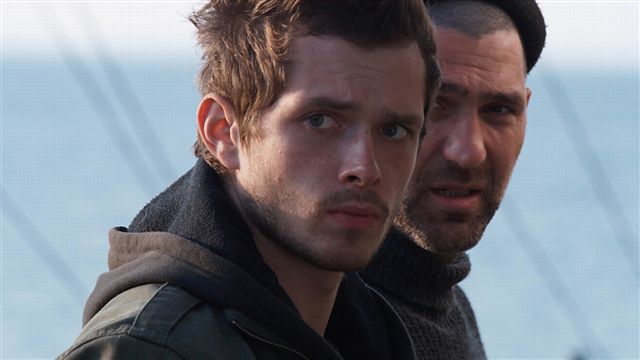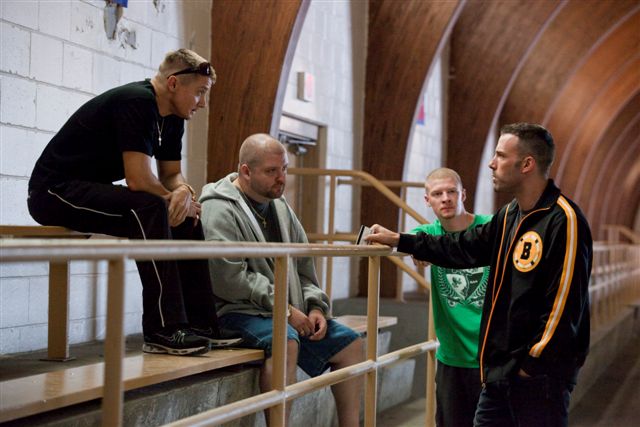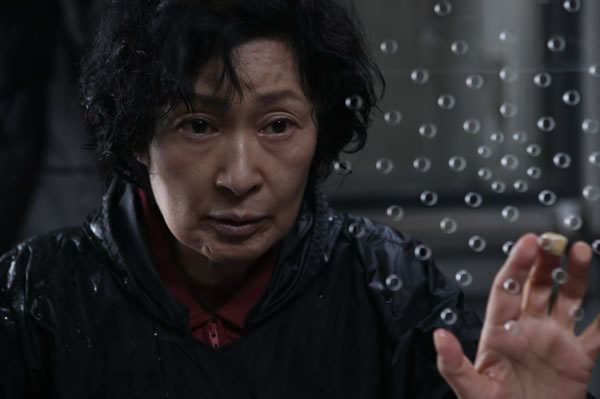‘Mother’
A recurring theme in this year’s festival was a rather extreme portrait of motherhood. First there was ‘Womb’, with Eva Green giving birth to and raising a clone of her deceased lover. Then there was ‘Animal Kingdom’, with Jacki Weaver’s chilling crime-family matriarch who is extremely supportive and uncommonly clingy to her adult sociopathic sons. And finally we have Bong Joon-Ho’s ‘Mother’, which, true to its title, is a distillation of motherhood. Kim Hye-ja quite simply plays a mother who will stop at nothing to get her son out of jail, where he was put for the murder of a girl in their small South-Korean town. Kim will follow any clue that may exonerate her son. She will give up her savings, beg, threaten or assault to prove his innocence
Her son is basically a man-child, one to whom she has devoted her life. In one early scene, she cuts herself at work because she is watching him across the street. Surprisingly, – despite some oedipal flirtation – she is not depicted as insane, or blinded to reality. She is a poor widow who has no one in life but her son. Bong is one of South Korea’s most famous filmmakers, who likes to mix comedy and tragedy and violence and horror. His last film, ‘The Host’, was funny, but as it got more violent and horrific, it became less interesting. While still mixing it up tonally (there is a triumphant image of class warfare in this film, of two middle-class young men wreaking havoc on a golf course), ‘Mother’ is like its main character – tremendously focused, and, for my money, far more effective than the popular ‘The Host’.
The film rests on the shoulders of Kim Hye-ja, and she is tremendous. The opening scene is of Kim in a field, performing a weird dance for herself and the audience. By the time the dance is repeated at the end of the film, it gains devastating meaning, showing the extent of the sacrifice a mother will make for her son. It is a great ending to this striking film.
‘How I Ended This Summer’

An older man and a younger man are stuck together for several months at a weather monitering station in the north-eastern most point of Russia. One of them is told via radio to deliver some very bad news to the other one, but doesn’t find the right moment. That is the story of this riveting new film by Russian director Alexei Popogrebski (a guest of the festival). It is a bit too long, but otherwise, this human pinball machine secludes its character in a harsh landscape, throws in a ticking time-bomb, and watches the fallout. It can be seen as a morality tale (the impact of a compounded lie) or as allegory (though the director insists that none was intended), but I saw it as a good yarn, an exploration of male relationships in the tradition of the westerns of Ford, Hawkes and Mann.
In the Q&A after the film, Popogrebski said that he wanted to confront the situation in one of these remote outposts- the winter, the cold, the limitations on freedom, a place where “the inhumanly extreme becomes mundane”. “They’re not cosmonauts”, he says of the people chosen to man these stations. We see the drudgery of their responsibilities, and can sympathize with Pavel (Grigoriy Dobrygin), the younger man (who is on break from university) when he breaks the monotony by treating a communications outpost like a playground, suspending himself from the antennas and creating his own obstacle course. And we can understand his hesitance to deliver the bad news to Sergei (Sergei Puskepalis), whose general gruffness may turn to violence if faced with the news.
We can only watch with dread as Pavel goes to more and more extreme lengths to avoid telling Sergei, especially with the people on the radio asking hourly for Sergei’s response. The film becomes more primal as it progresses, bringing to mind ‘Lord of The Flies’ and ‘The Most Dangerous Game’ (not necessarily in its details, but in the animalistic tone). It is too limited a story to achieve the momentousness I suspect Popogrebski intended, but it is a terrifically crafted thriller, with beautiful barren vistas and a great sound-design (which, among other things, ingeniously uses varying pitches of radio static as musical score to subtly ratchet up the tension), and two very good performances.
‘The Town’

The closing film of the festival, ‘The Town’ is the sophomore feature from co-writer/director Ben Affleck, who stars in the film as well. Although I found it gripping while watching it, it unfortunately falls apart even upon the most cursory examination, and is a significant step down from ‘Gone Baby Gone’, Affleck’s uneven but very compelling directorial debut. Set in Affleck’s native Boston (though one doesn’t get much feel for the place), ‘The Town’ is a straightforward heist film, which heavily borrows from many predecessors, most notably Michael Mann’s seminal ‘Heat’. Affleck, along with the partners from the Bostonian neighborhood of Charlestown, perform a series of bank roberries. On one of these heists, Affleck’s somewhat unhinged partner (played by ‘The Hurt Locker’s Jeremy Renner) takesa bank manager played by Rebecca Hall hostage, whom the gang lets go after their getaway. As the FBI (represented here by Don Draper himself, Jon Hamm) search for the gang, Affleck’s character becomes involved with Hall’s bank manager, and complications ensue.
For a film that was entertaining in the theater, it is surprising how lame it seems upon reflection. No memorable characters, no particularly interesting performances, no notable dialogue, every plot development a cliché and an unbelievably forced, pat ending. To its credit, some of the action scenes are staged well, and are the one element where Affleck shows a surer hand than he did in ‘Gone Baby Gone’. But that is small consolation for an utterly unoriginal and casually nihilistic film. Violence was destructive in ‘Gone Baby Gone’, while here people are casually gunned down and it means nothing. At the end of ‘Gone Baby Gone’, I was left with a tremendous moral dilemma. After thinking about ‘The Town’, I am left with nothing but disappointment.
SHLOMO PORATH






